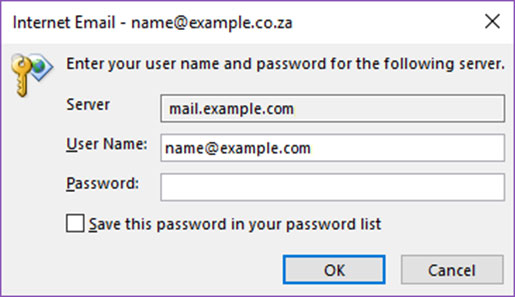Manual Setup for FMAIL.CO.UK email account on your Android Phone using incoming (IMAP) and outgoing(SMTP)server details
Step 1: Start by selecting the Mail icon from your applications screen. Enter the email address and email password. Choose Manual Setup
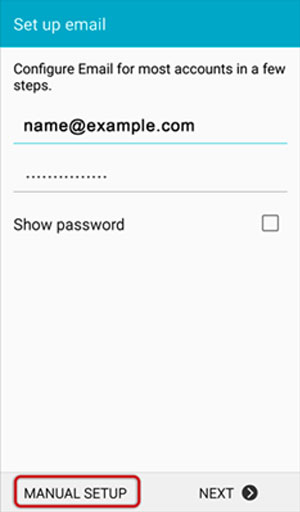
Step 2: Choose IMAP
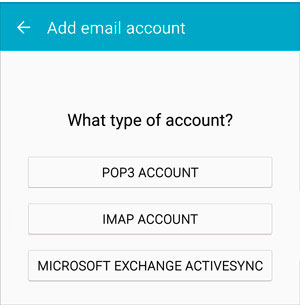
Step 3: If you have choosen IMAP make sure to enter the below settings and click Next
- IMAP Server: mail.messagingengine.com
- Security type is None
- Port is 993 for IMAP
- Secure - Port: 993and Security Type: SSL/TLS (Accept all certificates)
- Insecure - Port: 143 and Security Type: None (Accept all certificates)
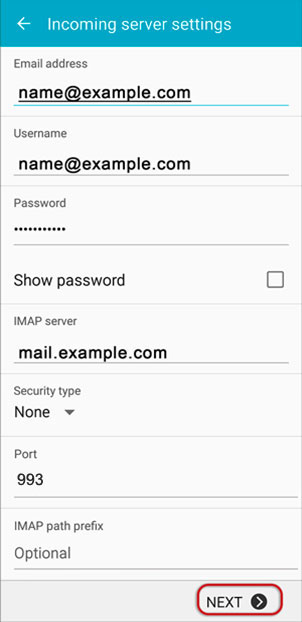
Step 4: Enter the below outgoing SMTP Settings for FMAIL.CO.UK and click Select Next
- SMTP Server: mail.messagingengine.com
- Security type is None
- Port is 587 for outgoing SMTP
- Outgoing (SMTP) Secure - Port: 465 for and Security Type: SSL/TLS (Accept all certificates)
- Outgoing (SMTP roaming server) Secure - Port: 587 and Security Type: SSL/TLS (Accept all certificates)
- Outgoing (SMTP) - Port: 25 and Security Type: None (Accept all certificates)
- Outgoing (SMTP roaming server) Insecure - Port: 587 and Security Type: None (Accept all certificates)
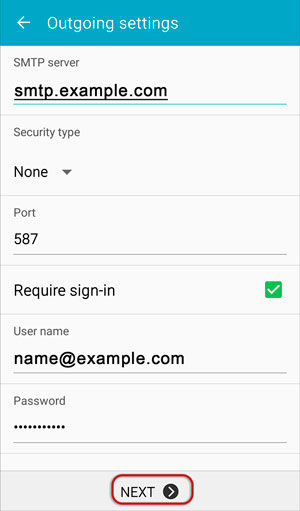
Step 5: Select Done. Congratulations! You are all done here and ready to use your email account on your Android phone. If you still have problems please visit this article.
Manual Setup for FMAIL.CO.UK email account on your Apple iPhone
Step 1: Select the Settings icon on your home screen

Step 2: Select Mail
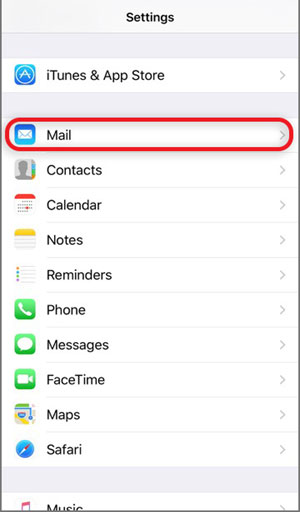
Step 3: Select Accounts
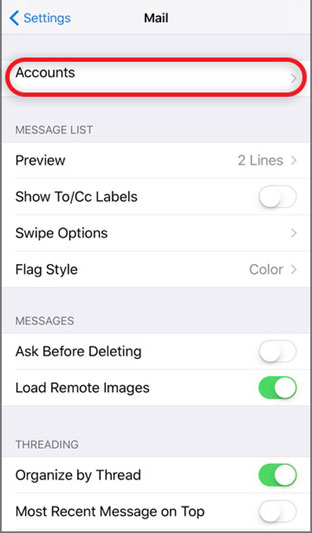
Step 4: Select Add Account
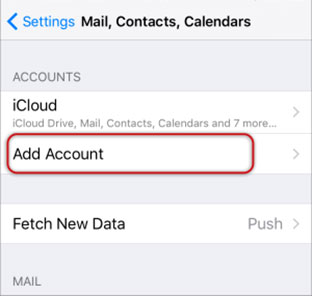
Step 5: Select Other from the menu
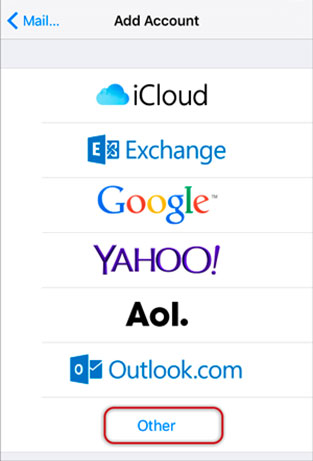
Step 6: Select Add Mail Account
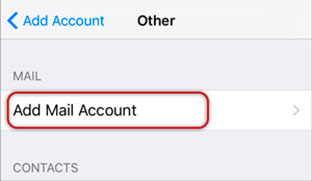
Step 7: Enter your Name, Email & Password and then click Next
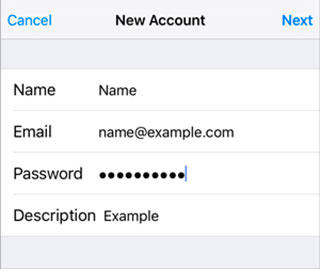
Step 8: Select IMAP . Scroll down to Incoming Mail Server and enter all the relevant details, then do the same for Outgoing Mail Server, as in the screen below and then select Next.
- Ensure that User Name is the full email address. User Name & Password are the same for both Incoming & Outgoing servers.
- Incoming Mail Server Host Name is mail.messagingengine.com
- Outgoing Mail Server Host Name is mail.messagingengine.com
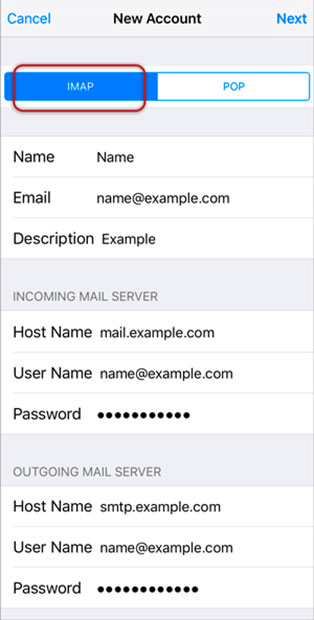
Step 9: You may receive a prompt asking you to verify the incoming and outgoing servers – you can click continue for each or tap "Details" and then tap "Trust"
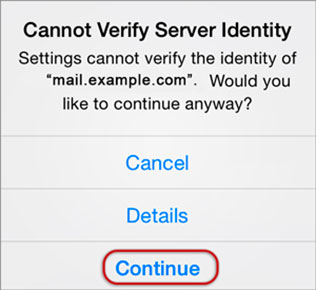
Step 10: Save
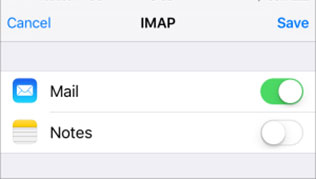
Step 11: Choose the new account that you’ve just created
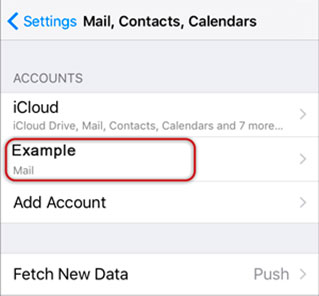
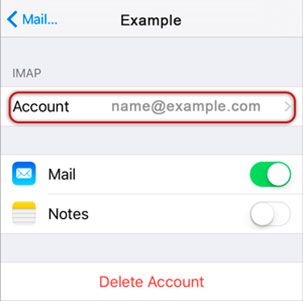
Step 12: Choose the SMTP server
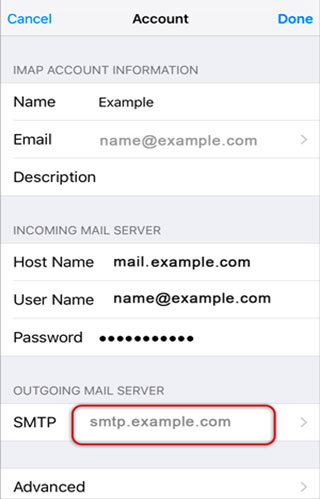
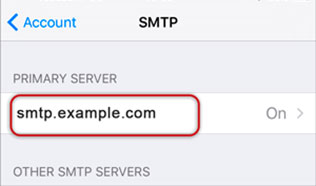
Step 13: Check the SMTP settings and click Done
- Outgoing Mail Server Host Name for FMAIL.CO.UK is mail.messagingengine.com
- User Name: Full FMAIL.CO.UK email address
- Password: Your email password
- Use SSL is On. You can also turn it off and use the correct Port number as below.
- Outgoing (SMTP) Secure - Port: 465 for and Security Type: SSL/TLS (Accept all certificates)
- Outgoing (SMTP roaming server) Secure - Port: 587 and Security Type: SSL/TLS (Accept all certificates)
- Outgoing (SMTP) - Port: 25 and Security Type: None (Accept all certificates)
- Outgoing (SMTP roaming server) Insecure - Port: 587 and Security Type: None (Accept all certificates)
- Authentication is Password
- Server Port is 587
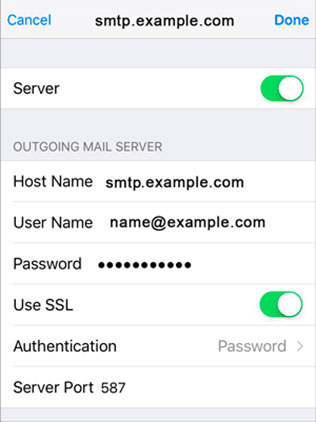
Congratulations! You are all done here and ready to use your email account on your iPhone. If you still have problems please visit this article.
Manual Setup for FMAIL.CO.UK email account on your Apple Mail
Step 1: Launch Mail App. From the toolbar at the top, select Mail and then Add Account
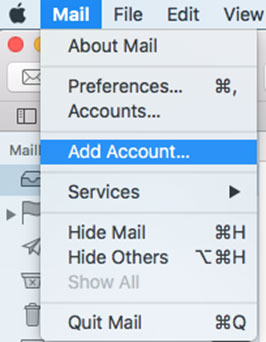
Step 2: You can choose the automatic configuration of the email for the known used email accounts from the list and if you do not, you should choose Other Mail Account and setup your email manually
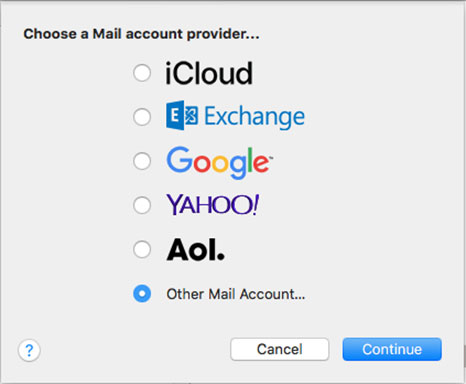
Step 3: Enter your details and then click Sign In
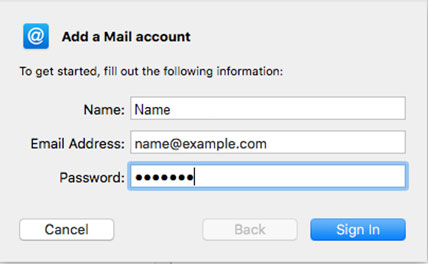
Step 4: Complete the settings as follows and click Sign In
- Email Address & User Name: Your full FMAIL.CO.UK email address
- Password: Your FMAIL.CO.UK password
- Account Type is IMAP or POP according to preference (IMAP is the default).
- Incoming Mail Server Host Name for FMAIL.CO.UK is mail.messagingengine.com
- Outgoing Mail Server Host Name for FMAIL.CO.UK is mail.messagingengine.com
- For domains still in transfer or propagation, temporarily use the IP Address in place of Incoming & Outgoing Mail Server
- Ignore Unable to verify account name or password
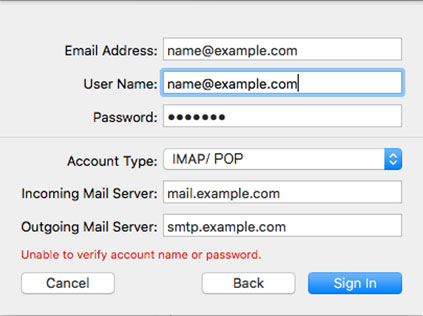
Step 5: Ignore the 2 server identity messages > Continue. You can add the certificate to your trust settings to avoid seeing this message in the future.

Step 6: Select any apps > Done
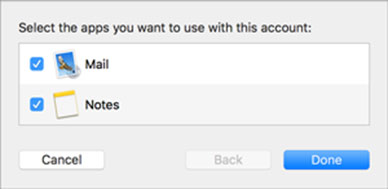
Congratulations! You are all done here and ready to use your email account on your Apple Mail. If you still have problems please visit this article.
Manul Setup for FMAIL.CO.UK email account on eM Client
Step 1: Launch eM Client. Click on the Menu tab, then Tools and select Accounts
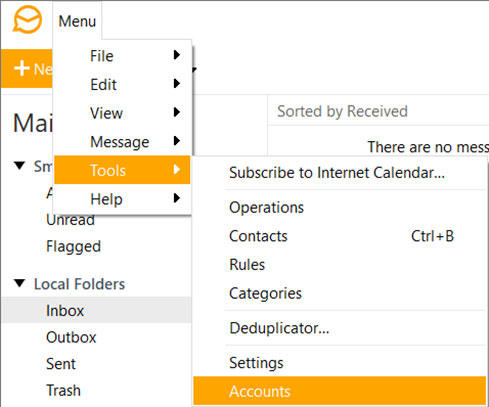
Step 2: Expand the Mail section. You can choose the automatic configuration of the email for the known used email accounts from the list and if you do not, you should choose Other, then Next and setup your email manually
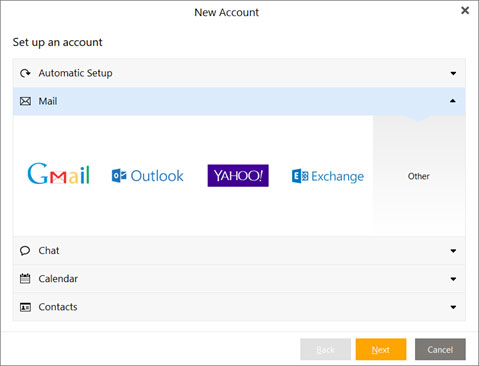
Step 3: Enter your full FMAIL.CO.UK email address
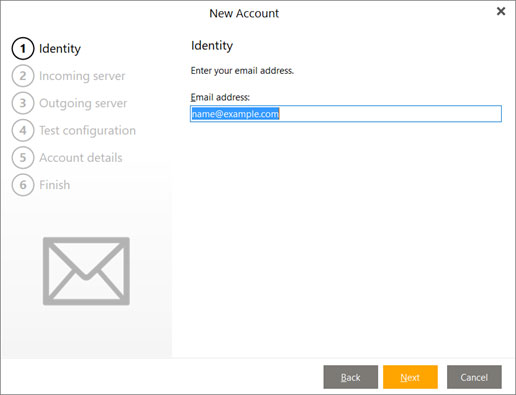
Step 4: You will need to enter the following information, Choose IMAP or POP. Here we choose IMAP.
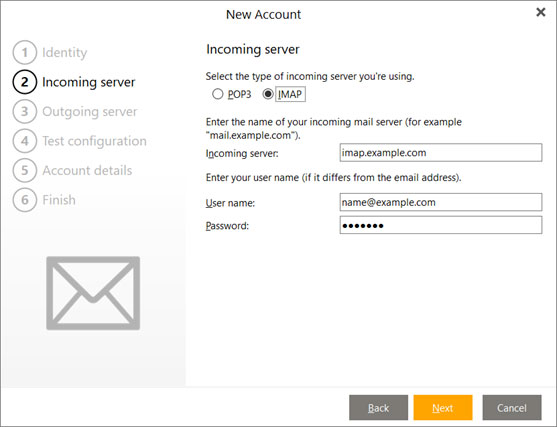
Step 5: Enter your outgoing mail server details. Modify any of the auto-populated fields, if necessary and click Next
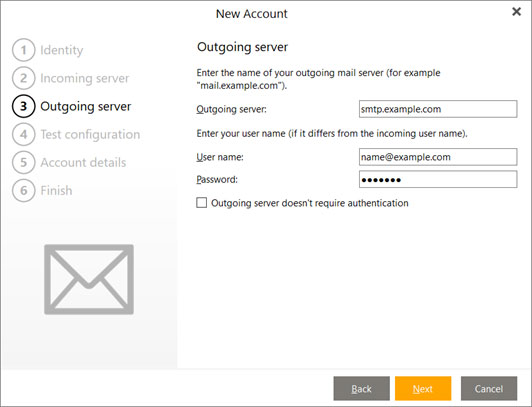
Step 6: If there are any failed configuration tests, click Fix to attempt to resolve the error. If no errors, click Next
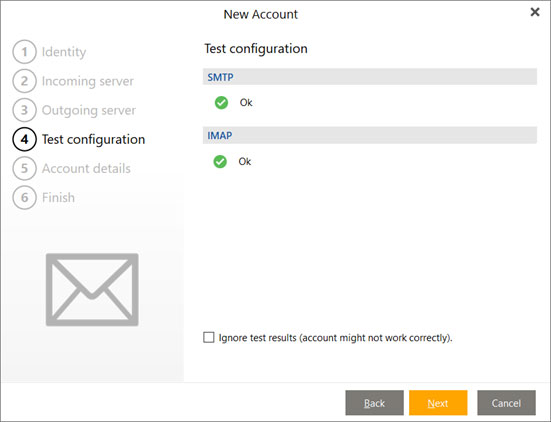
Step 7: Enter the name and the email address that your account will use
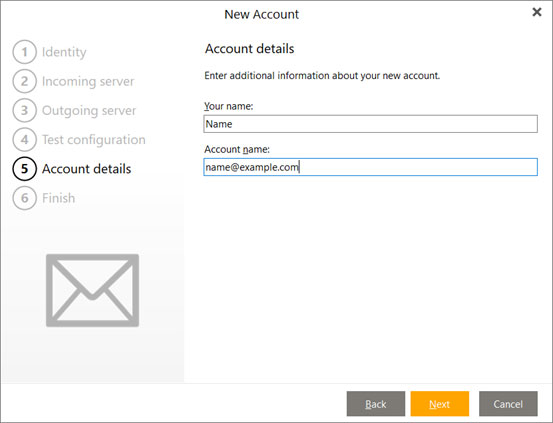
Step 8: Click Finish to complete the configuration
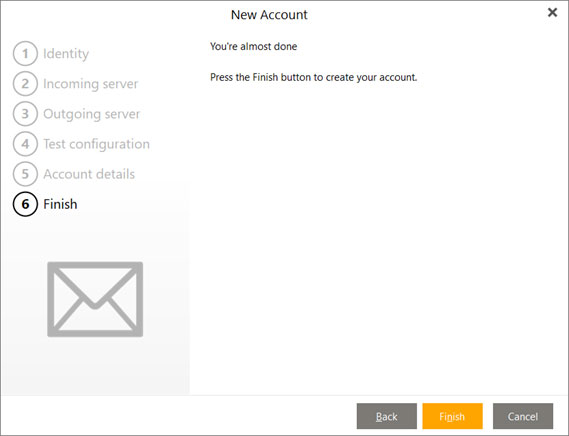
Congratulations! You are all done here and ready to use your email account on eM client. If you still have problems please visit this article.
Manual Setup for FMAIL.CO.UK email account on Entourage Client
Step 1: Launch Microsoft Entourage. Click the Entourage menu and choose Account Settings
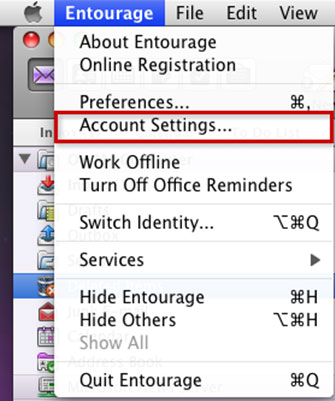
Step 2: Click the New icon in the Accounts window that opens
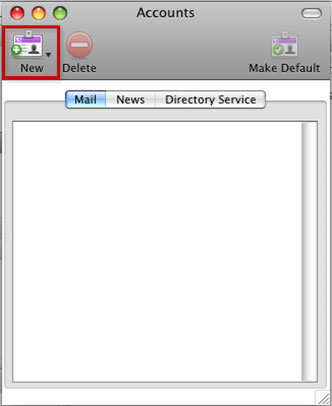
Step 3: Choose the type of email account you will be using (IMAP, POP or Exchange). We choose IMAP
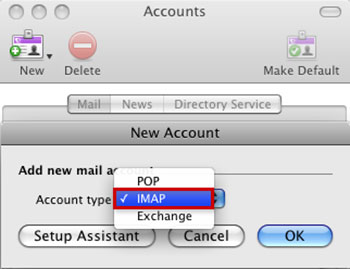
Step 4: Click the OK button to continue

Step 5: You will need to enter the following information and then click Click here for advanced receiving options
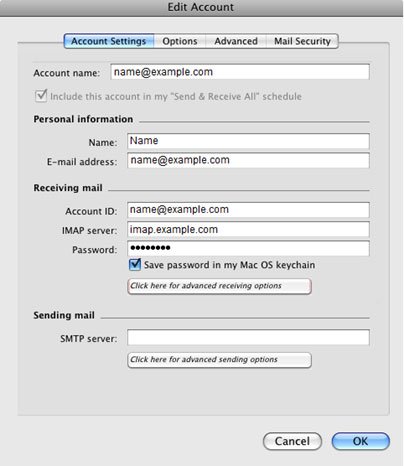
Step 6: Check the box for This IMAP service requires a secure connection. Then click anywhere on the Edit Account window in the background to return to the previous window.
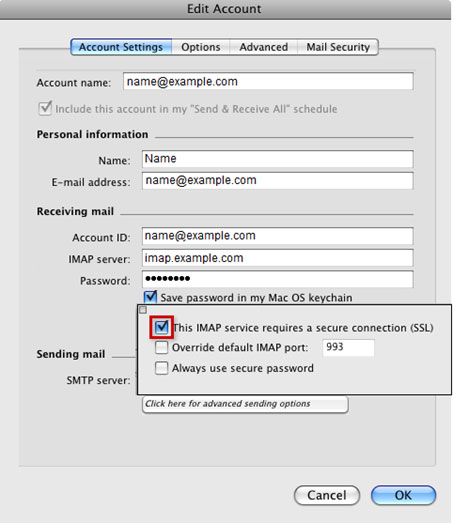
Step 7: Fill in the Outgoing mail servers details and then click the button that says Click here for advanced sending options
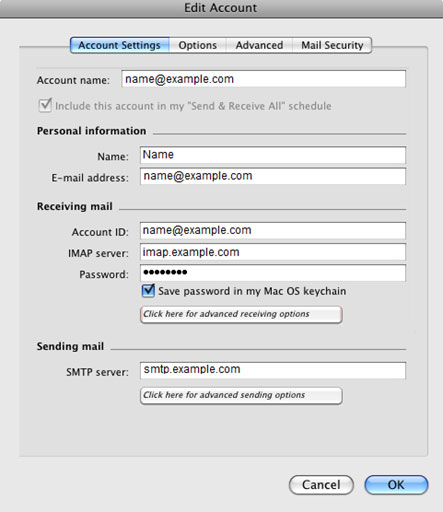
Step 8: Check mark the following boxes:
- SMTP service requires secure connection (SSL)
- Override the default SMTP port and enter port 587 or 587 instead. Below is the general SMTP settings that you can use
- Outgoing (SMTP) Secure - Port: 465 for and Security Type: SSL/TLS (Accept all certificates)
- Outgoing (SMTP roaming server) Secure - Port: 587 and Security Type: SSL/TLS (Accept all certificates)
- Outgoing (SMTP) - Port: 25 and Security Type: None (Accept all certificates)
- Outgoing (SMTP roaming server) Insecure - Port: 587 and Security Type: None (Accept all certificates)
- SMTP server requires authentication and choose Use same settings as receiving mail server Click anywhere on the Edit Account window in the background to return to the previous window.
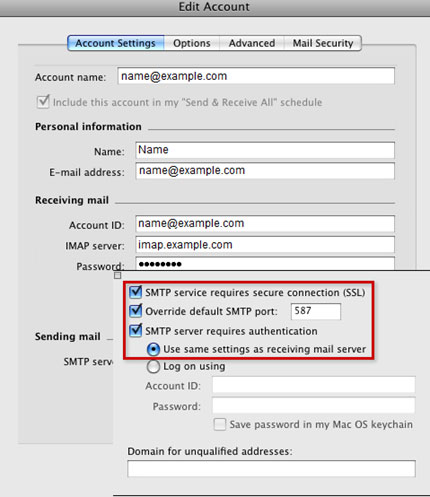
Step 9: Click OK
Congratulations! You are all done here and ready to use your email account on Entourage. If you still have problems please visit this article.
Manual Setup for FMAIL.CO.UK email account on IncrediMail Client
Step 1: Launch IncrediMail. Select Tools from the top menu bar and then Email Accounts. Note: If you are setting up your email account for the first time, you should start from Step 4.
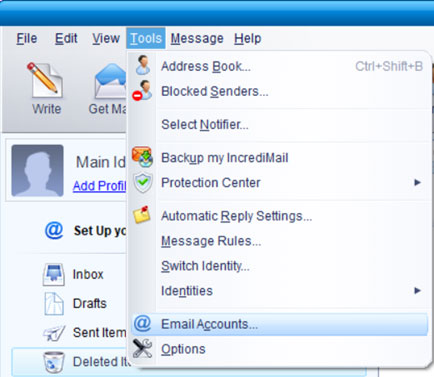
Step 2: Click Add
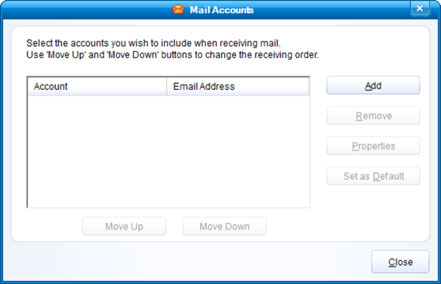
Step 3: You can choose the automatic configuration of the email for the known used email accounts from the list and if you do not, you should choose Other and setup your email manually
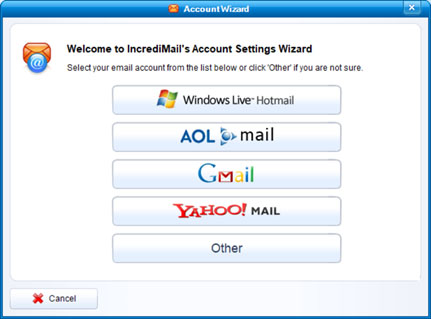
Step 4: Enter your details on the AccountWizard screen and then click Next
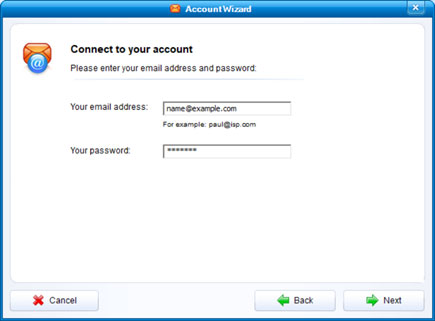
Step 5: Fill in the Incoming(IMAP) and Outgoing(SMTP) mail servers details. Then click Next
- Account type : IMAP. Select IMAP from the dropdown
- Incoming mail server IMAP: mail.messagingengine.com
- Outgoing mail server SMTP : mail.messagingengine.com
- General server port details for incoming and outgoing:
- Outgoing (SMTP) Secure - Port: 465 for and Security Type: SSL/TLS (Accept all certificates)
- Outgoing (SMTP roaming server) Secure - Port: 587 and Security Type: SSL/TLS (Accept all certificates)
- Outgoing (SMTP) - Port: 25 and Security Type: None (Accept all certificates)
- Outgoing (SMTP roaming server) Insecure - Port: 587 and Security Type: None (Accept all certificates)
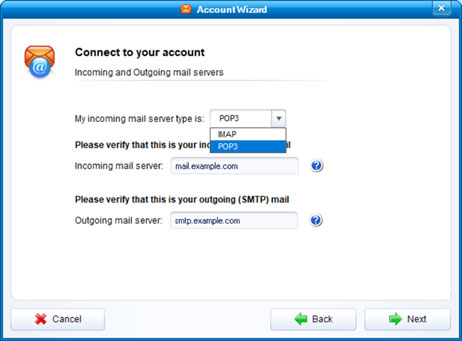
Step 6: Click OK
Congratulations! You are all done here and ready to use your email account on IncrediMail. If you still have problems please visit this article.
Manual Setup for FMAIL.CO.UK email account on MailBird Lite
Step 1: Launch Mailbird Lite. Click on three parallel lines on the upper left corner and then choose Settings
Note: Please remember that Lite user can only have a maximum of 1 account. If you are setting up your email account for the first time, you should start from Step 4.
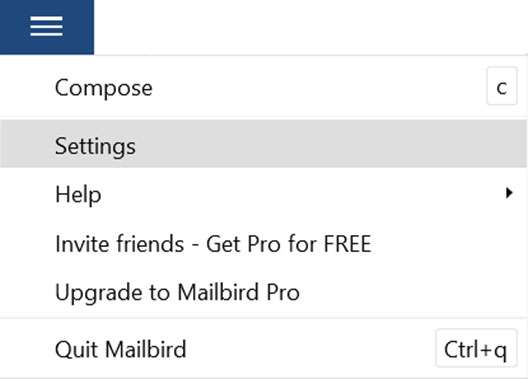
Step 2: Switch to Accounts tab and click Add button
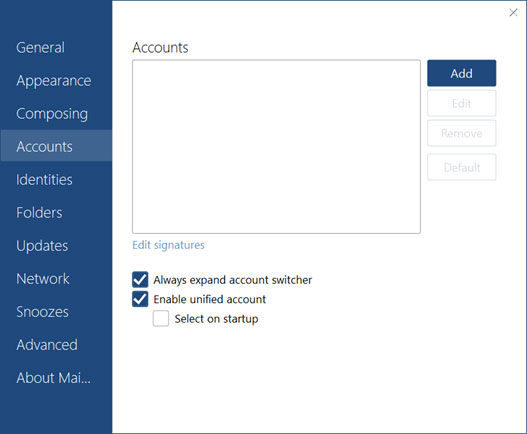
Step 3: Enter your details on the Add account screen and then click Continue
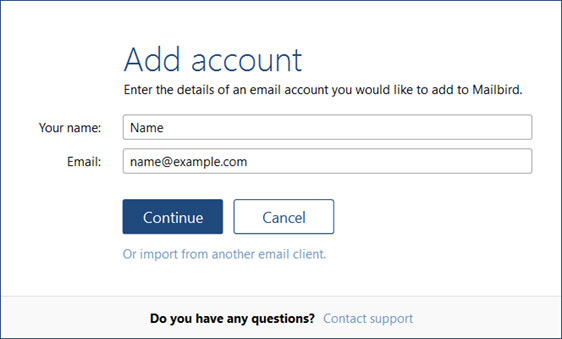
Step 4: If Mailbird knows the IMAP or POP3 settings for your email account, then Mailbird will display this window. You need to enter your password first before you can Continue. However you are still able to edit your settings by clicking "Edit Server Settings".
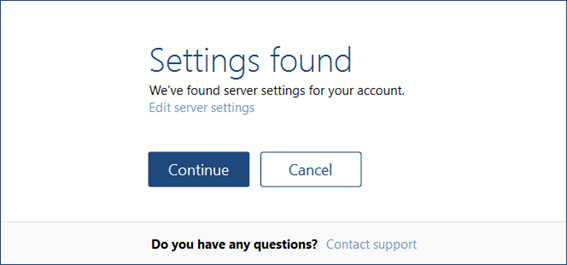
Step 5: If Mailbird can’t find settings for your email account or if you choose to Edit Server Settings, then Mailbird will display this window. Enter your details on the screen and then click Continue. Note: If you use Secure SSL / TLS Settings, choose the corresponding Encryption in the current field.
- Incoming Server type for FMAIL.CO.UK, select IMAP
- Incoming Server name for FMAIL.CO.UK, enter mail.messagingengine.com
- Username for FMAIL.CO.UK - Enter your full email address
- Password for FMAIL.CO.UK - Enter your password
- Outgoing Server name for FMAIL.CO.UK, enter mail.messagingengine.com
- Enter your FMAIL.CO.UK email address and password for username and password field.
- General port details for incoming and outgoing server
- POP
- Secure - Port: 995 and Security Type: SSL/TLS (Accept all certificates)
- Insecure - Port: 110 and Security Type: None (Accept all certificates)
- IMAP
- Secure - Port: 993and Security Type: SSL/TLS (Accept all certificates)
- Insecure - Port: 143 and Security Type: None (Accept all certificates
- SMTP
- Outgoing (SMTP) Secure - Port: 465 for and Security Type: SSL/TLS (Accept all certificates)
- Outgoing (SMTP roaming server) Secure - Port: 587 and Security Type: SSL/TLS (Accept all certificates)
- Outgoing (SMTP) - Port: 25 and Security Type: None (Accept all certificates)
- Outgoing (SMTP roaming server) Insecure - Port: 587 and Security Type: None (Accept all certificates)
- POP
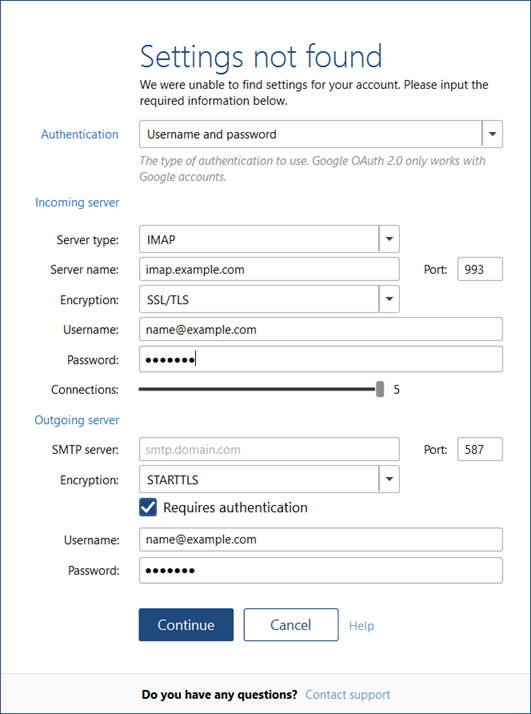
Step 6: Click Close and you are done!
Congratulations! You are all done here and ready to use your email account on Mailbird Lite. If you still have problems please visit this article.
Manual setup for FMAIL.CO.UK email account on Opera Mail
Step 1: Launch Opera Mail.Select Email, then click Next
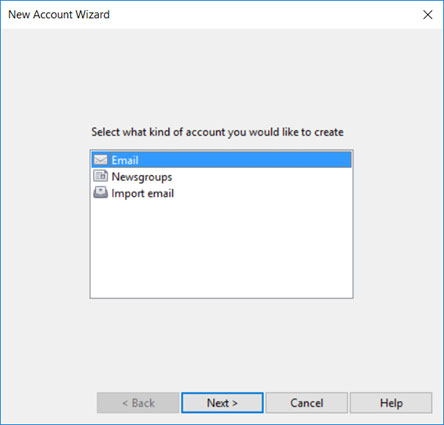
Step 2: Type in Name, FMAIL.CO.UK email address and organization into the corresponding fields. Then click Next
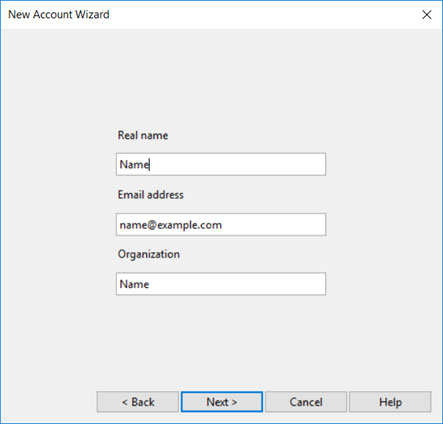
Step 3: Type in your login name (your full FMAIL.CO.UK email address) and password for your email account. Select the Email Account type (POP or IMAP). We choose IMAP. Click Next
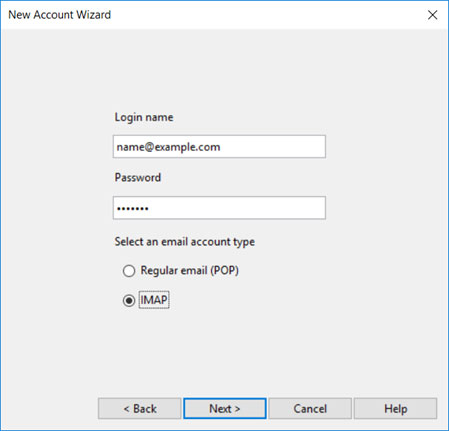
Step 4: Type in Incoming Mail Server(IMAP) for FMAIL.CO.UK as mail.messagingengine.com and Outgoing server(SMTP) name as mail.messagingengine.com. Note: If you use Secure TLS Settings, check the “Use secure connection (TLS)” box in both outgoing and Incoming mails. Click Finish
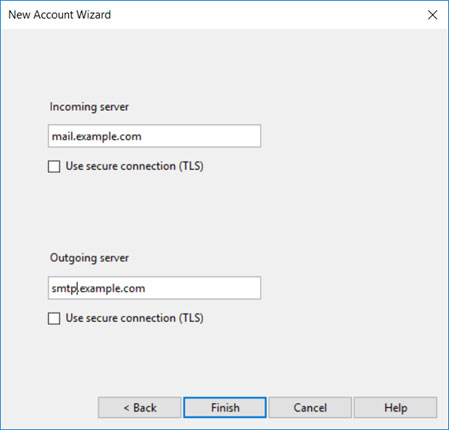
Step 5: Click on the Menu (Opera Mail) tab in Opera and select Mail Accounts
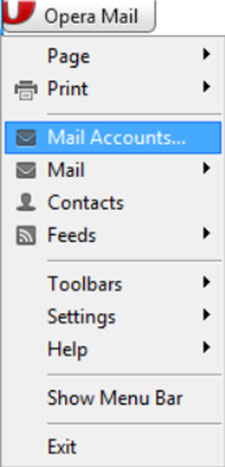
Step 6: Select the account you are configuring and click Edit
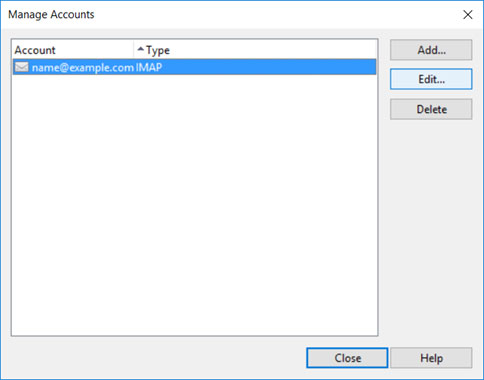
Step 7: Click on the Servers tab. For IMAP the port number should be 993. For Outgoing SMTP server the port number should be 587. Authentication should be set to AUTH LOGIN. Note : If you use Secure TLS Settings, check the “Secure connection (TLS)” box in both outgoing and Incoming mails. Below are the general port details.
- POP
- Secure - Port: 995 and Security Type: SSL/TLS (Accept all certificates)
- Insecure - Port: 110 and Security Type: None (Accept all certificates)
- IMAP
- Secure - Port: 993and Security Type: SSL/TLS (Accept all certificates)
- Insecure - Port: 143 and Security Type: None (Accept all certificates
- SMTP
- Outgoing (SMTP) Secure - Port: 465 for and Security Type: SSL/TLS (Accept all certificates)
- Outgoing (SMTP roaming server) Secure - Port: 587 and Security Type: SSL/TLS (Accept all certificates)
- Outgoing (SMTP) - Port: 25 and Security Type: None (Accept all certificates)
- Outgoing (SMTP roaming server) Insecure - Port: 587 and Security Type: None (Accept all certificates)
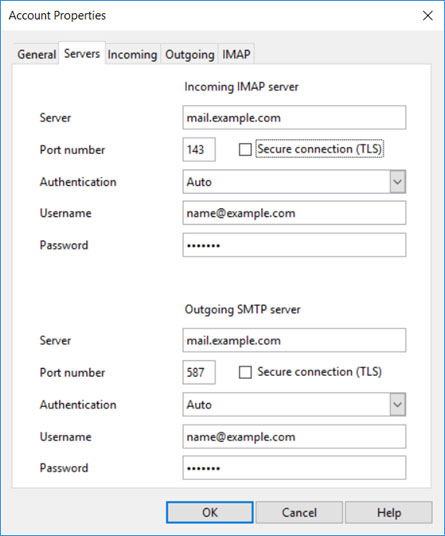
Step 9: Click OK and Close to finish
Congratulations! You are all done here and ready to use your email account on Opera. If you still have problems please visit this article.
Setup Manaul Setup for FMAIL.CO.UK email account on Thunderbird
Step 1: Launch Thunderbird. Click Local Folders > Email
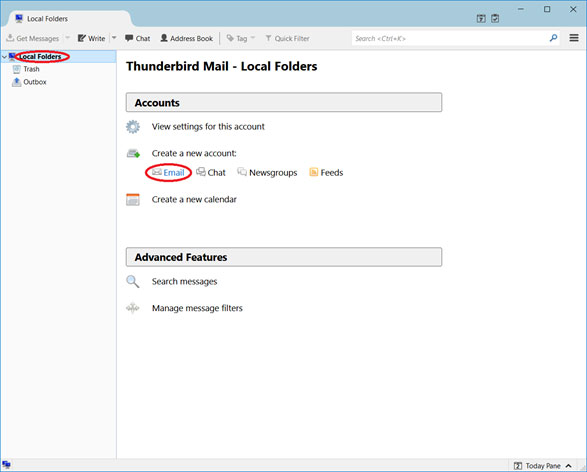
Step 2: Click Skip this and use my existing email
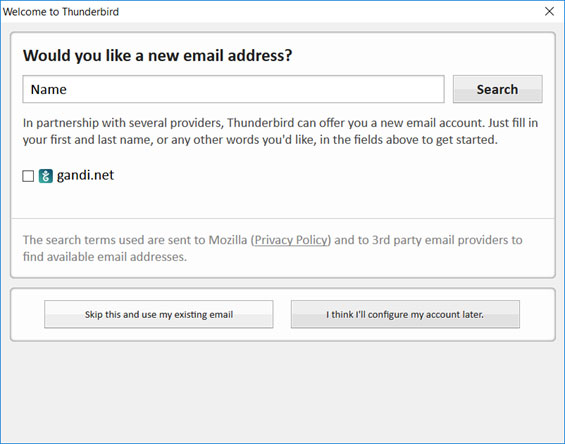
Step 3: You will need to enter the following information and then click Continue
Your name : Type your name. This is the name of the sender in email messages that you send from this account
Email address : Your full FMAIL.CO.UK email address
Password : Your FMAIL.CO.UK email account password
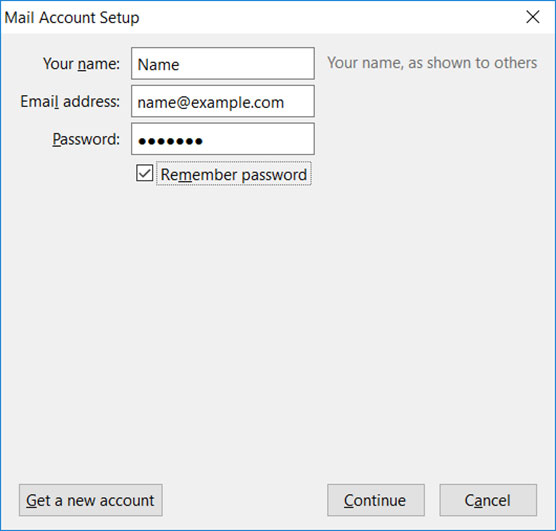
Step 4: Choose the type of email account you will be using (IMAP or POP). If you choose Secure SSL / TLS Setting, please select Normal password for Authentication.
Using IMAP/POP3 for your FMAIL.CO.UK account. Click Manual Config. Here we choose IMAP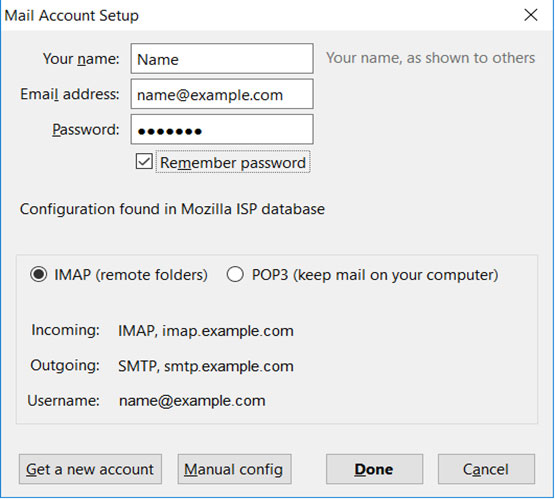
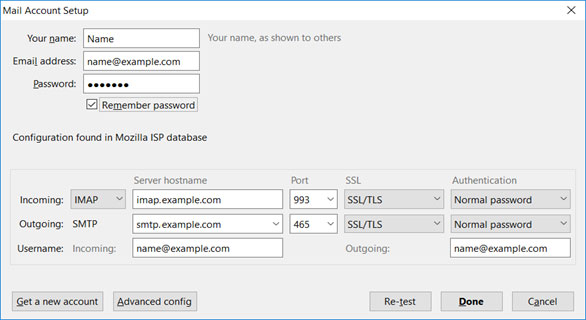
IMAP port settings for FMAIL.CO.UK
- Incoming Port: 143, Outgoing Port: 587
- Secure - Port: 993and Security Type: SSL/TLS (Accept all certificates)
- Insecure - Port: 143 and Security Type: None (Accept all certificates
- Not ticked: This server requires an encrypted connection (SSL)
- Use the following type of encrypted connection is None
POP port settings for FMAIL.CO.UK
- Incoming Port: 110, Outgoing Port: 587
- General settings for POP
- Secure - Port: 995 and Security Type: SSL/TLS (Accept all certificates)
- Insecure - Port: 110 and Security Type: None (Accept all certificates)
- Not ticked: This server requires an encrypted connection (SSL)
- Use the following type of encrypted connection is None
General SMTP port settings for FMAIL.CO.UK
- Outgoing (SMTP) Secure - Port: 465 for and Security Type: SSL/TLS (Accept all certificates)
- Outgoing (SMTP roaming server) Secure - Port: 587 and Security Type: SSL/TLS (Accept all certificates)
- Outgoing (SMTP) - Port: 25 and Security Type: None (Accept all certificates)
- Outgoing (SMTP roaming server) Insecure - Port: 587 and Security Type: None (Accept all certificates)
Step 5: Click Done
Step 6: Click Confirm Security Exception
Congratulations! You are all done here and ready to use your email account on Thunderbird. If you still have problems please visit this article.
Automatic setup for FMAIL.CO.UK email account on Outlook 2007
Step 1: Launch Outlook 2007. Select Tools from the top menu bar, then Accounts Settings
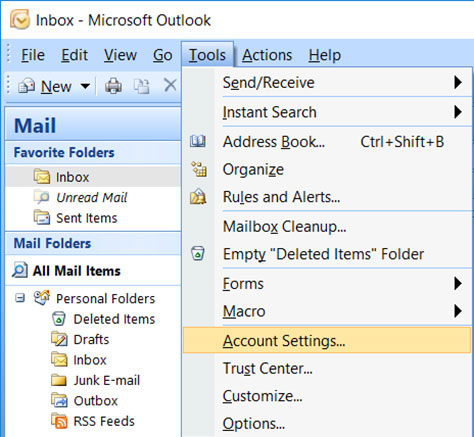
Step 2: On the Account Settings screen, click New on the E-mail tab
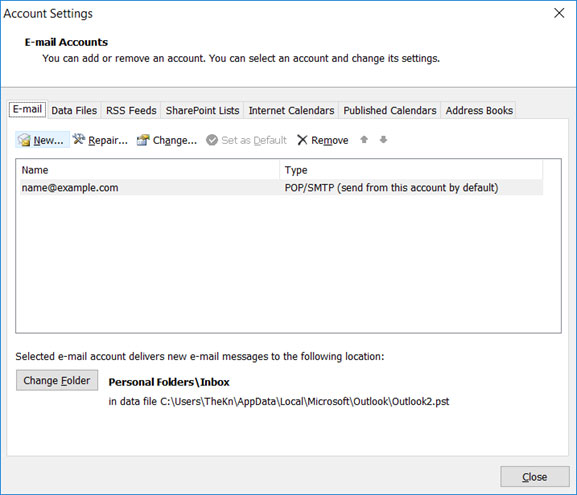
Step 3: Select Microsoft Exchange, POP3, IMAP or HTTPand click Next
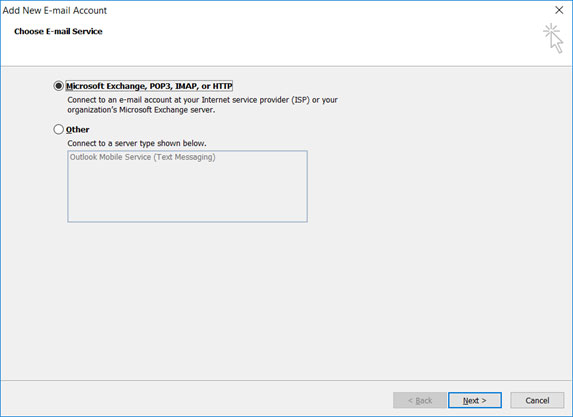
Step 4: On this screen enter your name, your FMAIL.CO.UK email address and password and click Next
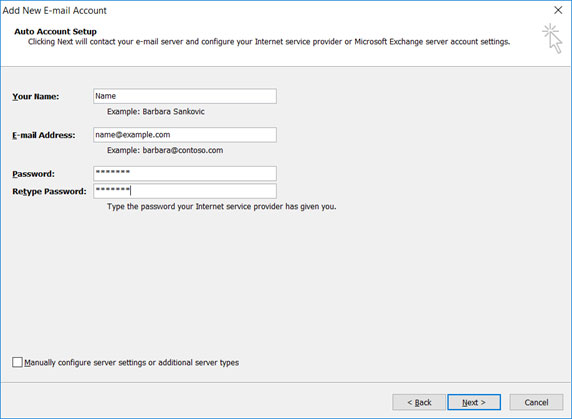
Step 5: Outlook will now automatically configure your account as an IMAP account with all the correct settings
Step 6: Finish > Close
Manual Setup for FMAIL.CO.UK email account on Outlook 2007
Step 1: Launch Outlook 2007. Select Tools from the top menu bar, then Accounts Settings

Step 2: On the Account Settings screen, click New on the E-mail tab
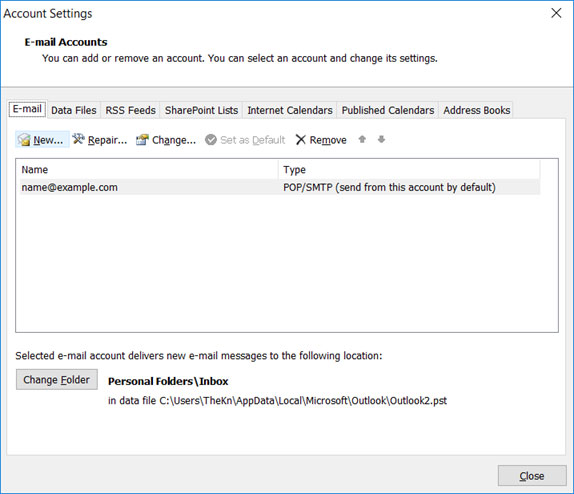
Step 3: Select Microsoft Exchange, POP3, IMAP or HTTPand click Next
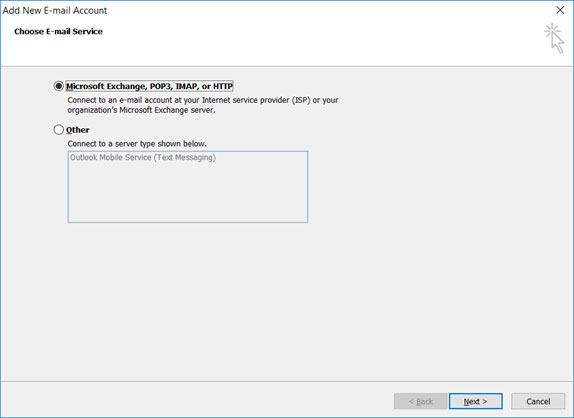
Step 4: Tick the Manually configure server settings or additional server types checkbox and click Next
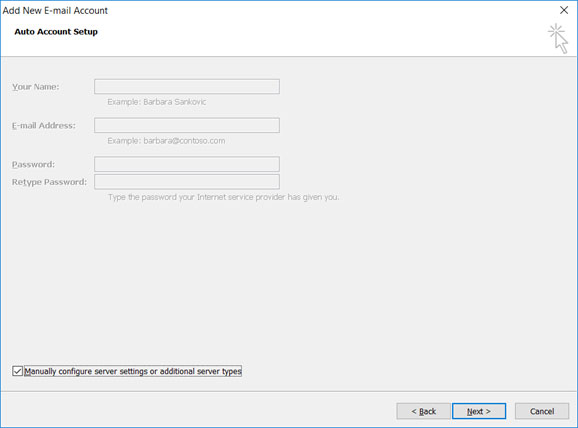
Step 5: Select Internet E-mail and then click Next
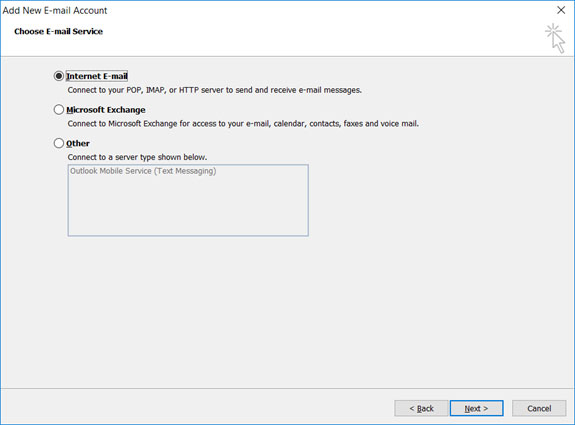
Step 6: Enter all the relevant details (choose either POP or IMAP according to your needs) and then click More Settings

Step 7: Click on the Outgoing Server tab and ensure that the My outgoing server (SMTP) requires authentication checkbox is selected, as well as Use same settings as my incoming mail server
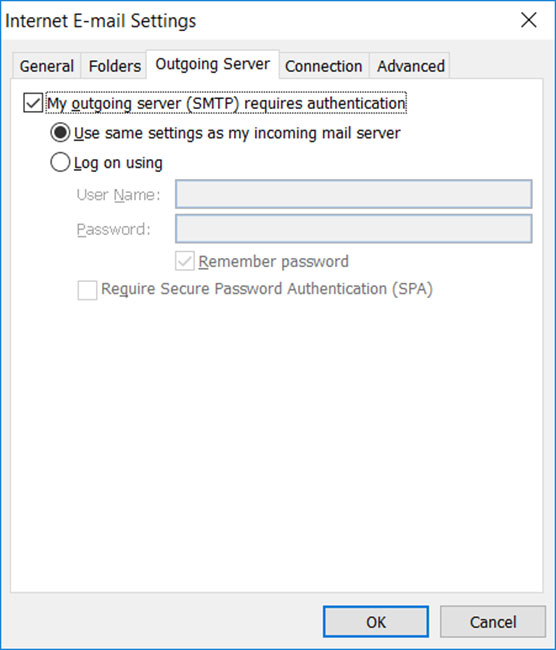
Step 9: Select the Advanced tab. Ensure that yourFMAIL.CO.UK settings are as below for your choice of either POP or IMAP.
POP port settings for FMAIL.CO.UK
- Incoming Port: 110, Outgoing Port: 587
- General settings for POP
- Secure - Port: 995 and Security Type: SSL/TLS (Accept all certificates)
- Insecure - Port: 110 and Security Type: None (Accept all certificates)
- Not ticked: This server requires an encrypted connection (SSL)
- Use the following type of encrypted connection is None
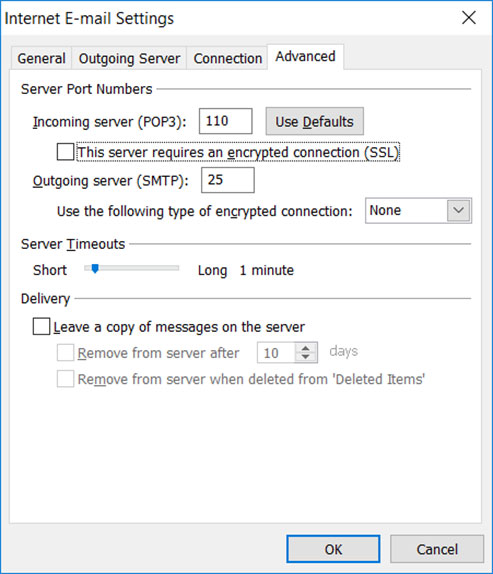
IMAP port settings for FMAIL.CO.UK
- Incoming Port: 143, Outgoing Port: 587
- Secure - Port: 993and Security Type: SSL/TLS (Accept all certificates)
- Insecure - Port: 143 and Security Type: None (Accept all certificates
- Not ticked: This server requires an encrypted connection (SSL)
- Use the following type of encrypted connection is None
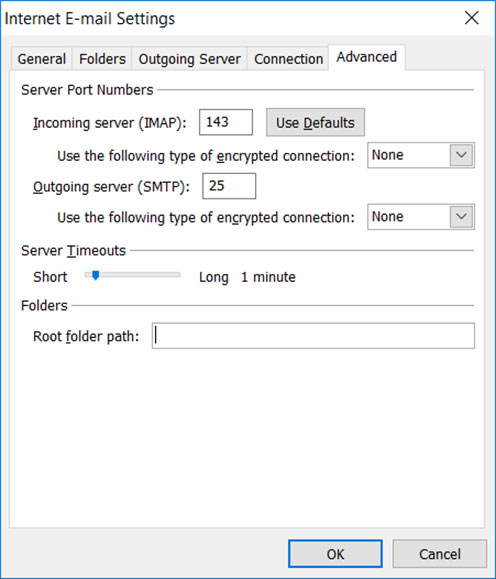
General SMTP port settings for FMAIL.CO.UK
- Outgoing (SMTP) Secure - Port: 465 for and Security Type: SSL/TLS (Accept all certificates)
- Outgoing (SMTP roaming server) Secure - Port: 587 and Security Type: SSL/TLS (Accept all certificates)
- Outgoing (SMTP) - Port: 25 and Security Type: None (Accept all certificates)
- Outgoing (SMTP roaming server) Insecure - Port: 587 and Security Type: None (Accept all certificates)
Step 10: Click OK to save these settings
Step 11: Click Next and Finish
Congratulations! You are all done here and ready to use your email account on Outlook 2007. If you still have problems please visit this article.
Automatic Account setup for FMAIL.CO.UK email account on Outlook 2010
Step 1: Launch Outlook 2010. Select File from the top menu bar and then Info and Account Settings
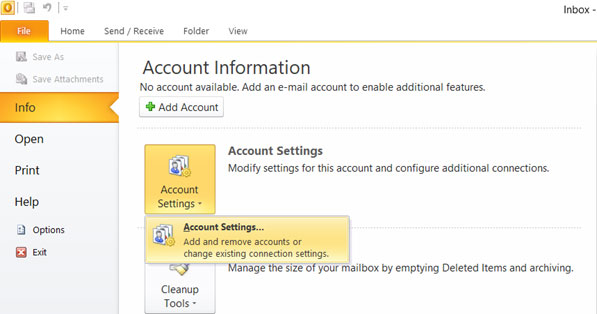
Step 2: On the E-mail tab, click New
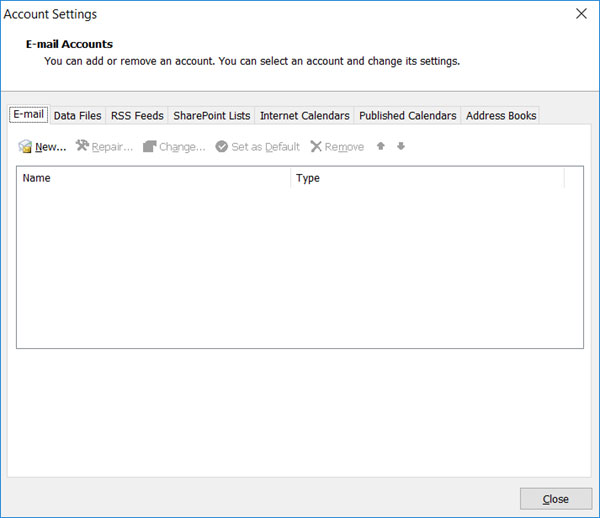
Step 4: On this screen enter your name, your FMAIL.CO.UK email address and password and click Next
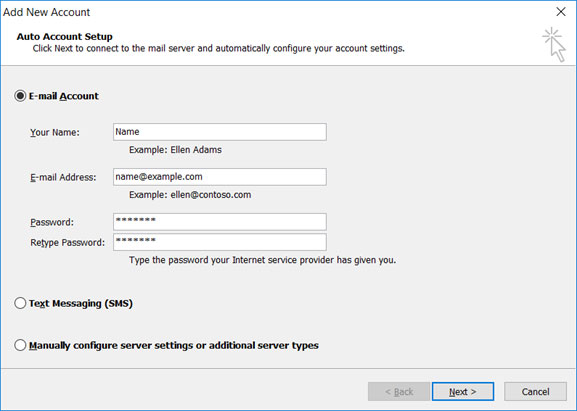
Step 4: Outlook will now automatically configure your account as an IMAP account with all the correct settings
Step 5: Finish > Close
Manual Setup for FMAIL.CO.UK email account on Outlook 2010
Step 1: Launch Outlook 2010. Select Tools from the top menu bar, then Accounts Settings

Step 2: On the Account Settings screen, click New on the E-mail tab
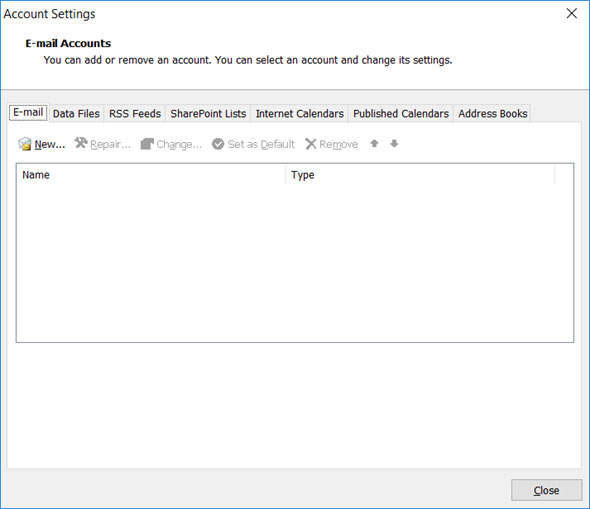
Step 3: In the Add New Account box choose Manual setup or additional server types > Next
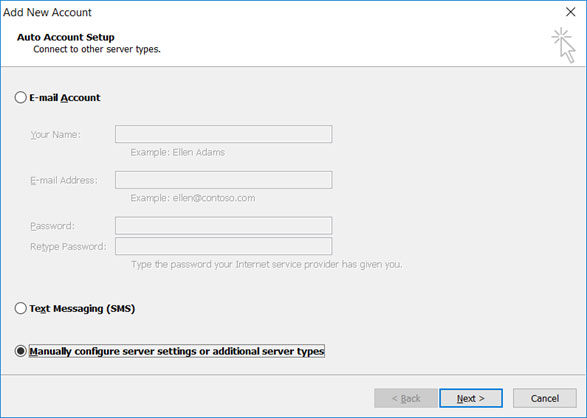
Step 4: Select Internet E-mail and click Next
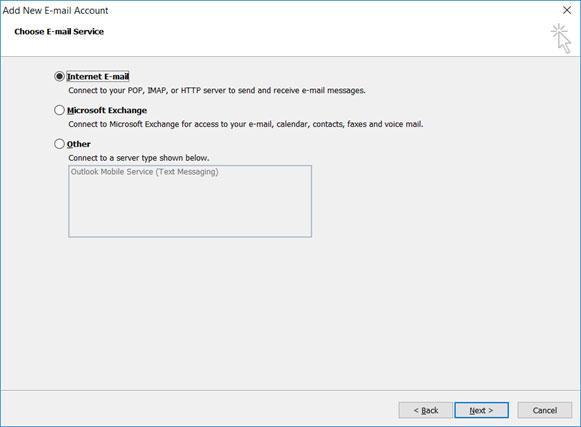
Step 5: Enter all the relevant details (Select POP or IMAP according to your preference) and then click More Settings
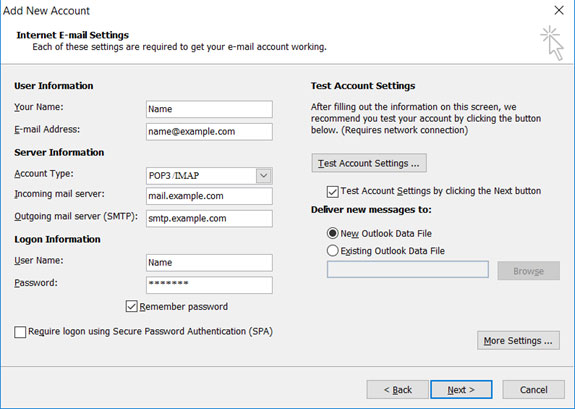
Step 6: Click on the Outgoing Server tab and ensure that the My outgoing server (SMTP) requires authentication checkbox is selected, as well as Use same settings as my incoming mail server
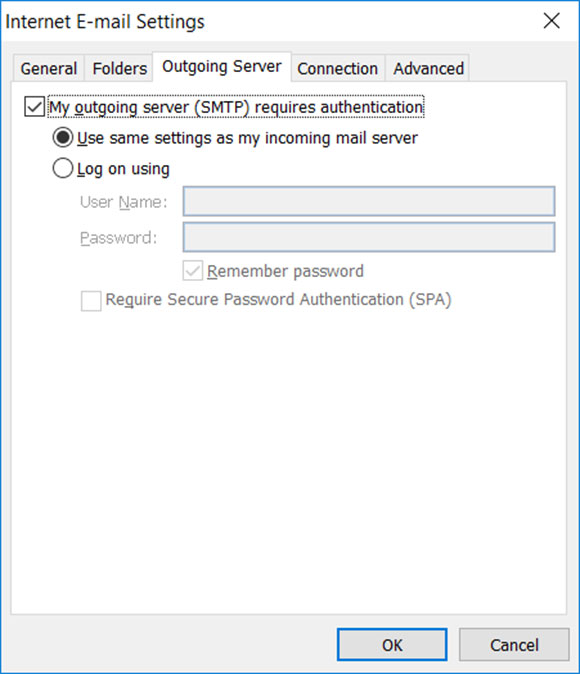
Step 7: Select the Advanced tabEnsure that yourFMAIL.CO.UK settings are as below for your choice of either POP or IMAP.
POP port settings for FMAIL.CO.UK
- Incoming Port: 110, Outgoing Port: 587
- General settings for POP
- Secure - Port: 995 and Security Type: SSL/TLS (Accept all certificates)
- Insecure - Port: 110 and Security Type: None (Accept all certificates)
- Not ticked: This server requires an encrypted connection (SSL)
- Use the following type of encrypted connection is None
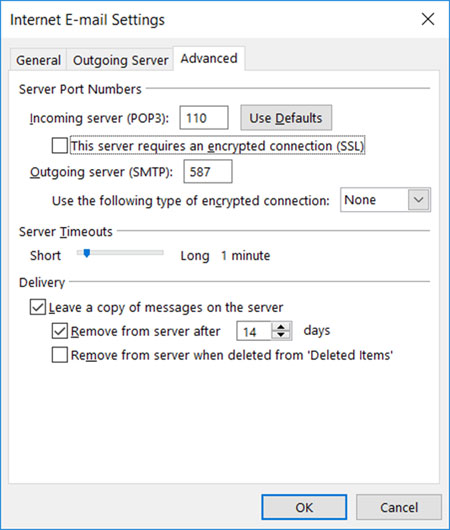
IMAP port settings for FMAIL.CO.UK
- Incoming Port: 143, Outgoing Port: 587
- Secure - Port: 993and Security Type: SSL/TLS (Accept all certificates)
- Insecure - Port: 143 and Security Type: None (Accept all certificates
- Not ticked: This server requires an encrypted connection (SSL)
- Use the following type of encrypted connection is None
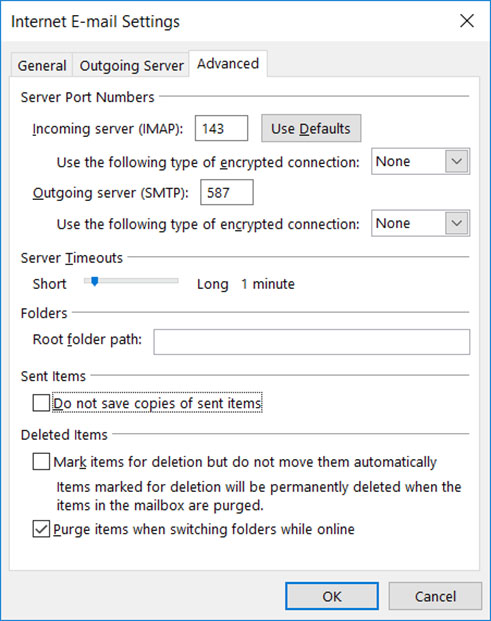
General SMTP port settings for FMAIL.CO.UK
- Outgoing (SMTP) Secure - Port: 465 for and Security Type: SSL/TLS (Accept all certificates)
- Outgoing (SMTP roaming server) Secure - Port: 587 and Security Type: SSL/TLS (Accept all certificates)
- Outgoing (SMTP) - Port: 25 and Security Type: None (Accept all certificates)
- Outgoing (SMTP roaming server) Insecure - Port: 587 and Security Type: None (Accept all certificates)
Step 8: Click OK to save these settings
Step 9: Click Next and Finish
Congratulations! You are all done here and ready to use your email account on Outlook 2010. If you still have problems please visit this article.
Automatic Account setup for FMAIL.CO.UK email account on Outlook 2013
Step 1: Launch Outlook 2013. Select File on the top left menu bar. Select Info and Account Settings
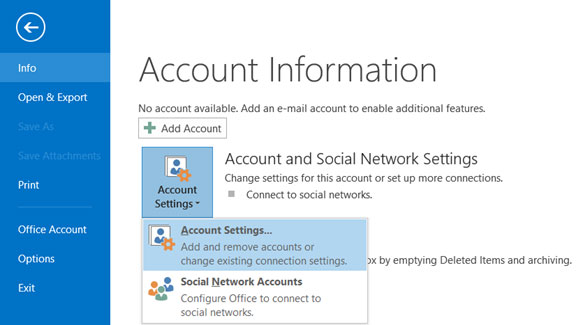
Step 2: Enter your details on the Auto Account Set-up screen > Next
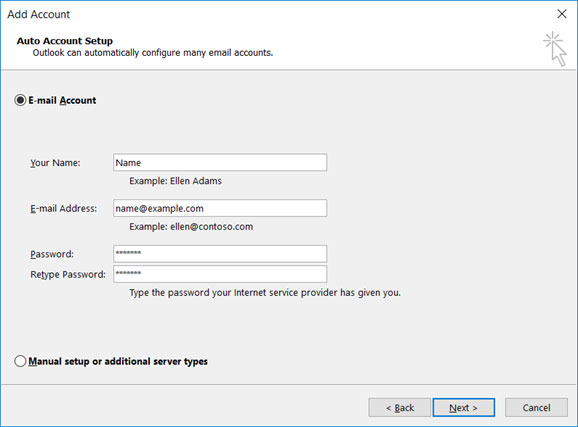
Step 3: The following warning messages may appear > Allow and Choose > Yes
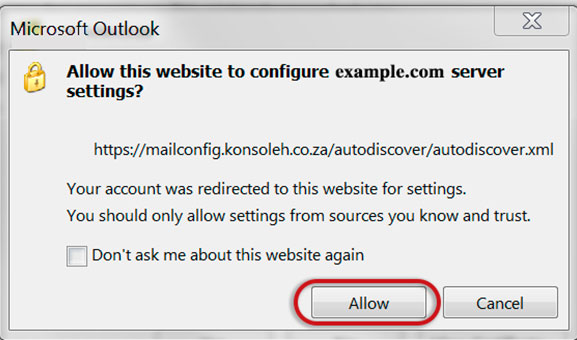
Step 4: Outlook will now automatically configure your account as an IMAP account with all the correct settings
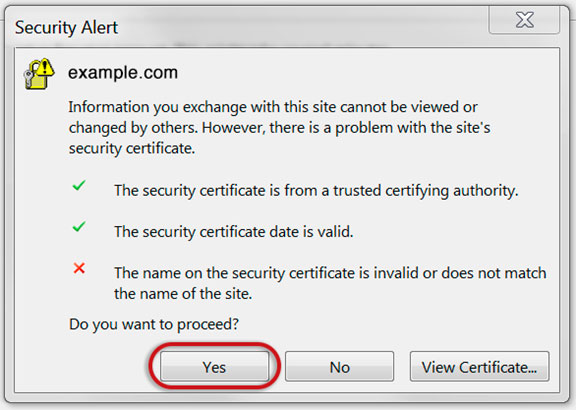
Step 6: Finish > Close
Manual Account setup for FMAIL.CO.UK email account on Outlook 2013
Step 1: Launch Outlook. Select File on the top left menu bar. Select Info and Account Settings
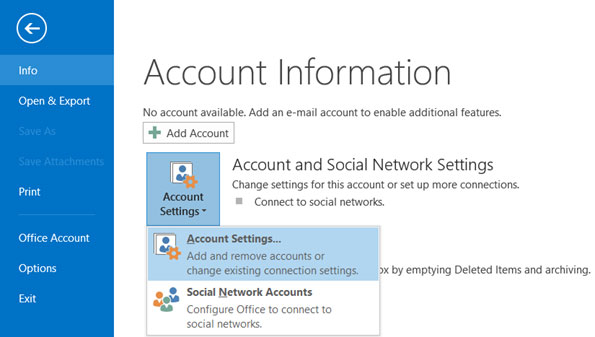
Step 2: Choose Manual Setup or additional server types > Next
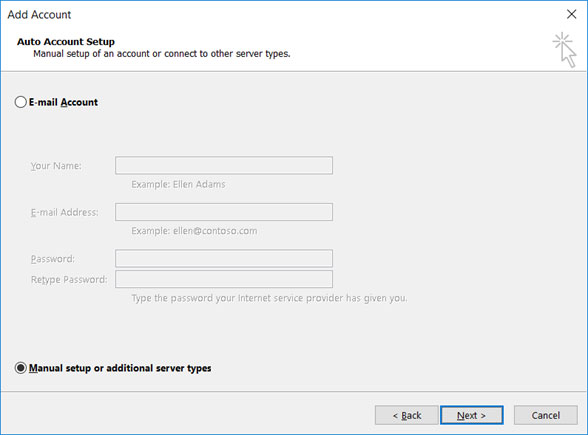
Step 3: Select POP or IMAP > Next

Step 4: . Enter all the relevant details (Select POP or IMAP according to your preference) and then click More Settings
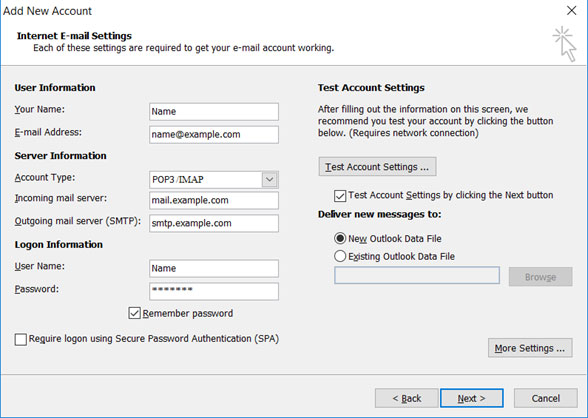
Step 5: Click on the Outgoing Server tab and ensure that the My outgoing server (SMTP) requires authentication checkbox is selected, as well as Use same settings as my incoming mail server
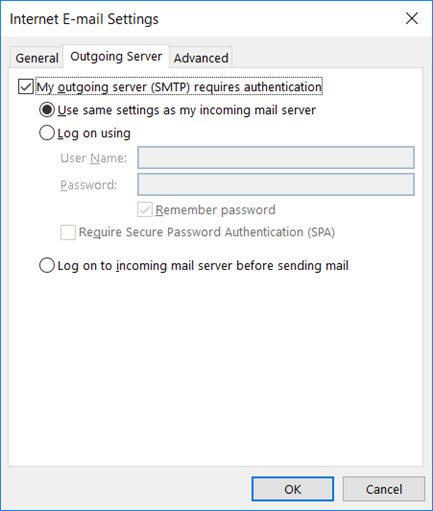
Step 6: Select the Advanced tab
Step 7: Ensure that your settings are as below for your choice of either POP or IMAP:
POP port settings for FMAIL.CO.UK
- Incoming Port: 110, Outgoing Port: 587
- General settings for POP
- Secure - Port: 995 and Security Type: SSL/TLS (Accept all certificates)
- Insecure - Port: 110 and Security Type: None (Accept all certificates)
- Not ticked: This server requires an encrypted connection (SSL)
- Use the following type of encrypted connection is None
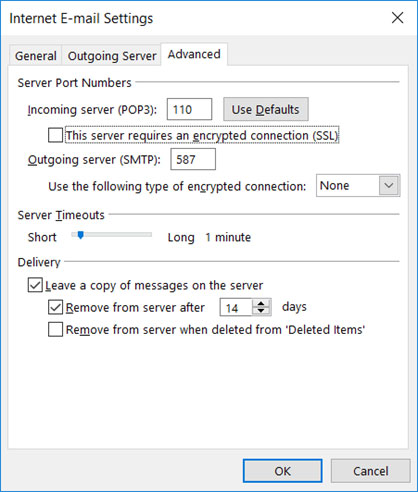
IMAP port settings for FMAIL.CO.UK
- Incoming Port: 143, Outgoing Port: 587
- Secure - Port: 993and Security Type: SSL/TLS (Accept all certificates)
- Insecure - Port: 143 and Security Type: None (Accept all certificates
- Not ticked: This server requires an encrypted connection (SSL)
- Use the following type of encrypted connection is None
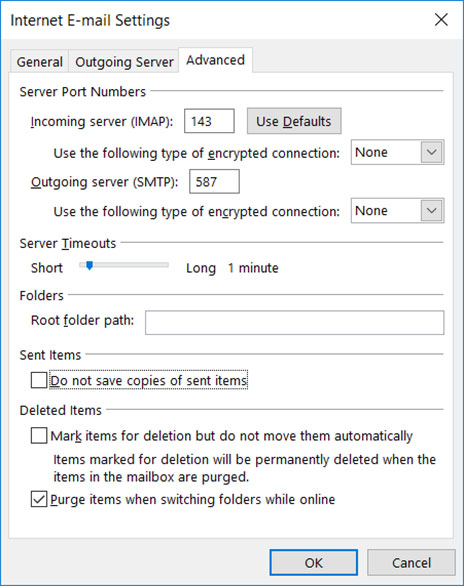
General SMTP port settings for FMAIL.CO.UK
- Outgoing (SMTP) Secure - Port: 465 for and Security Type: SSL/TLS (Accept all certificates)
- Outgoing (SMTP roaming server) Secure - Port: 587 and Security Type: SSL/TLS (Accept all certificates)
- Outgoing (SMTP) - Port: 25 and Security Type: None (Accept all certificates)
- Outgoing (SMTP roaming server) Insecure - Port: 587 and Security Type: None (Accept all certificates)
Step 8: Click OK to save these settings
Step 9: Click Next and Finish
Congratulations! You are all done here and ready to use your email account on Outlook 2013. If you still have problems please visit this article.
Automatic Account setup for FMAIL.CO.UK email account on Outlook 2016
Step 1: Launch Outlook. Select File on the top left menu bar. Select Info and Account Settings
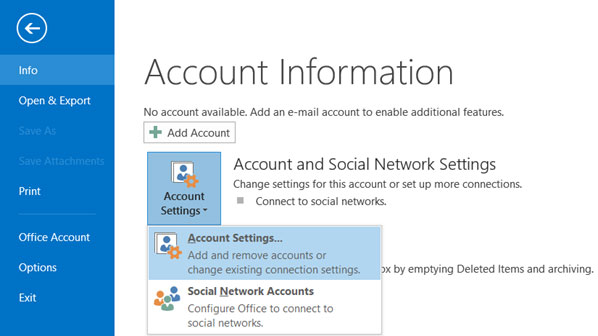
Step 2: Enter your details on the Auto Account Set-up screen > Next
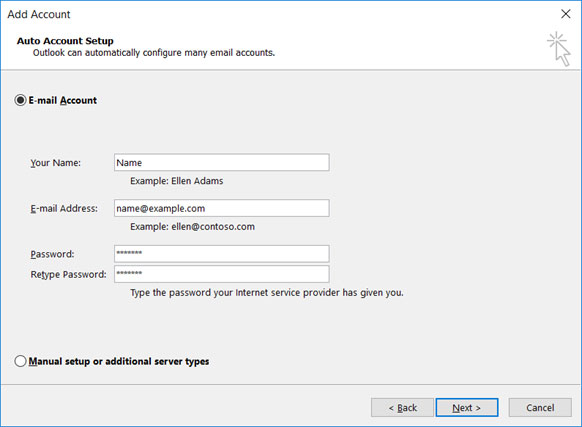
Step 3: Outlook will now automatically configure your account as an IMAP account with all the correct settings
Step 4: Finish > Close
Manual Account setup for FMAIL.CO.UK email account on Outlook 2016 - Method 1
Step 1: Launch Outlook. Select File on the top left menu bar. Select Info and Account Settings
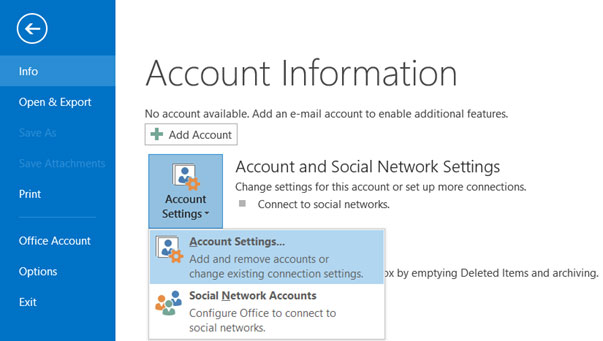
Step 2: Choose Manual Setup or additional server types > Next
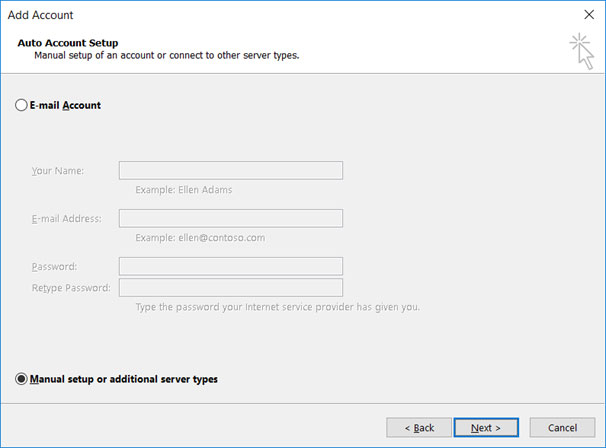
Step 3: Select POP or IMAP > Next
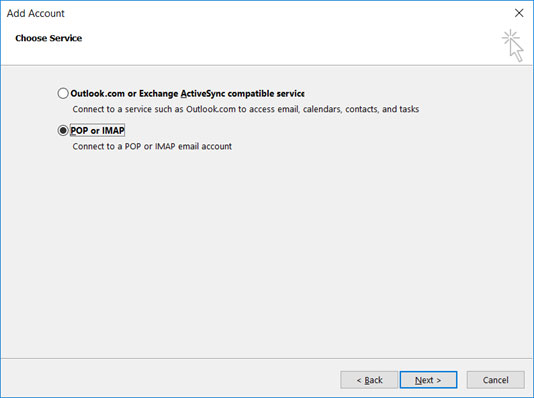
Step 5: Enter all the relevant details (Select POP or IMAP according to your preference) and then click More Settings
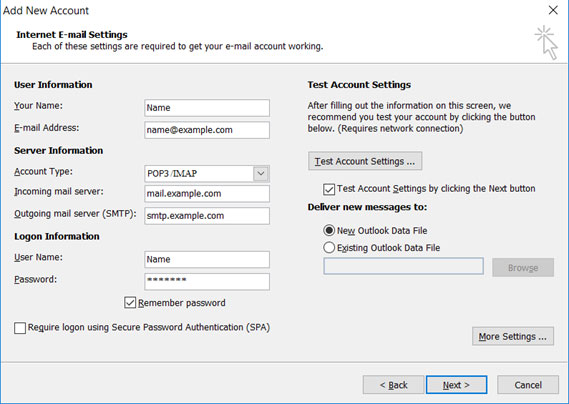
Step 6: Click on the Outgoing Server tab and ensure that the My outgoing server (SMTP) requires authentication checkbox is selected, as well as Use same settings as my incoming mail server
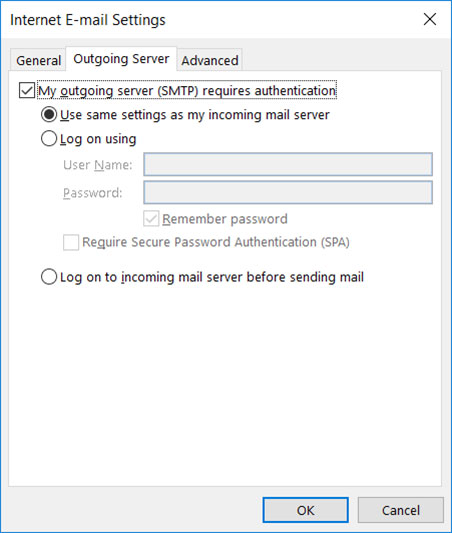
Step 7: . Select the Advanced tab. Ensure that your settings are as below for your choice of either POP or IMAP:
POP port settings for FMAIL.CO.UK
- Incoming Port(POP3): 110, Outgoing Port(SMTP): 587 or 587
- General settings for POP
- Secure - Port: 995 and Security Type: SSL/TLS (Accept all certificates)
- Insecure - Port: 110 and Security Type: None (Accept all certificates)
- Not ticked: This server requires an encrypted connection (SSL)
- Use the following type of encrypted connection is None
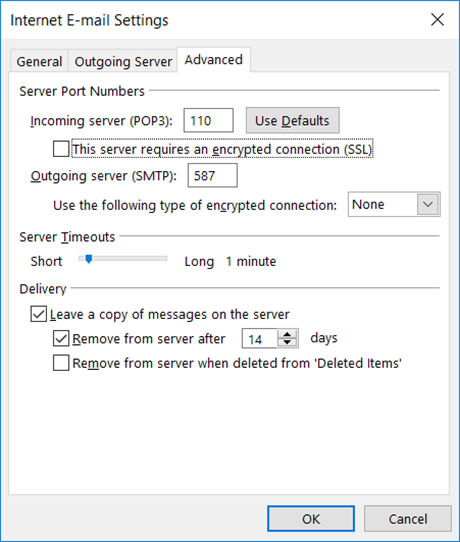
IMAP port settings for FMAIL.CO.UK
- Incoming Port: 143, Outgoing Port: 587
- Secure - Port: 993and Security Type: SSL/TLS (Accept all certificates)
- Insecure - Port: 143 and Security Type: None (Accept all certificates
- Not ticked: This server requires an encrypted connection (SSL)
- Use the following type of encrypted connection is None
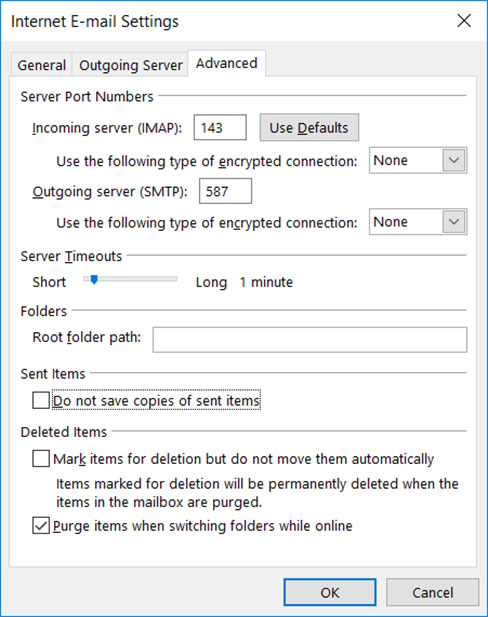
General SMTP port settings for FMAIL.CO.UK
- Outgoing (SMTP) Secure - Port: 465 for and Security Type: SSL/TLS (Accept all certificates)
- Outgoing (SMTP roaming server) Secure - Port: 587 and Security Type: SSL/TLS (Accept all certificates)
- Outgoing (SMTP) - Port: 25 and Security Type: None (Accept all certificates)
- Outgoing (SMTP roaming server) Insecure - Port: 587 and Security Type: None (Accept all certificates)
Step 8: Click OK to save these settings
Step 9: Click Next and Finish
Manual Account setup for FMAIL.CO.UK email account on Outlook 2016 - Method 2
Step 1: Launch Outlook. Select File on the top left menu bar. Select Info and Account Settings. Select the Add Account button in the middle of the screen, then Account Settings
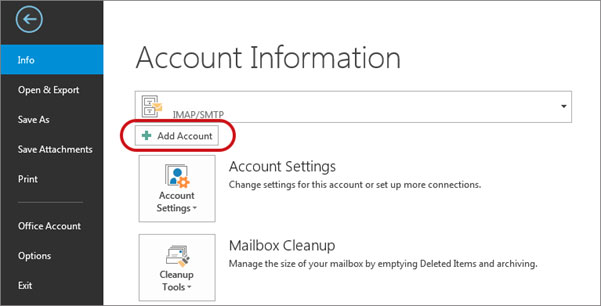
Step 2: . Insert your email address Select Advanced options, then select Let me setup my account manually > Connect
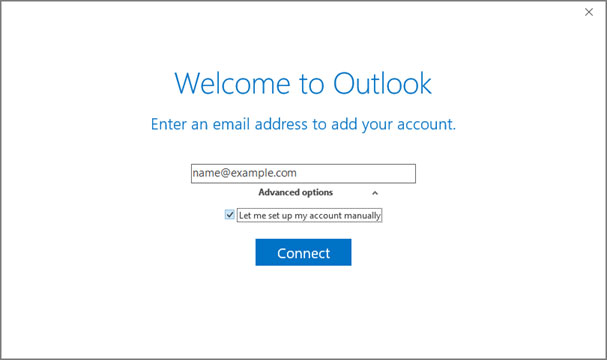
Step 3: This screen will display the various account options – select IMAP (or POP)>
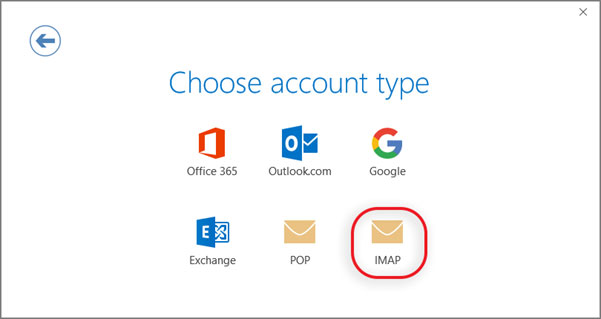
Step 4: Server Settings: Please make sure you enter the below incoming and outgoing server details
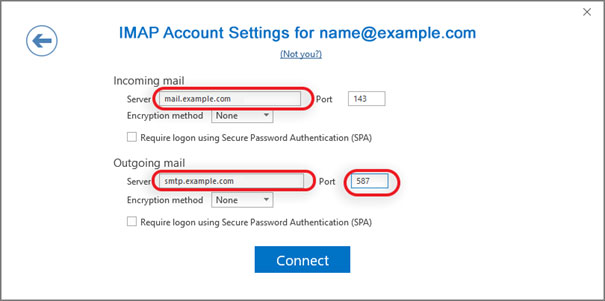
Incoming mail: You can choose to go for POP or IMAP. Below are the settings.
POP port settings for FMAIL.CO.UK
- Incoming Port: 110, Outgoing Port: 587
- General settings for POP
- Secure - Port: 995 and Security Type: SSL/TLS (Accept all certificates)
- Insecure - Port: 110 and Security Type: None (Accept all certificates)
- Not ticked: This server requires an encrypted connection (SSL)
- Use the following type of encrypted connection is None
IMAP port settings for FMAIL.CO.UK
- Incoming Port: 143, Outgoing Port: 587
- Secure - Port: 993and Security Type: SSL/TLS (Accept all certificates)
- Insecure - Port: 143 and Security Type: None (Accept all certificates
- Not ticked: This server requires an encrypted connection (SSL)
- Use the following type of encrypted connection is None
General SMTP port settings for FMAIL.CO.UK
- Outgoing (SMTP) Secure - Port: 465 for and Security Type: SSL/TLS (Accept all certificates)
- Outgoing (SMTP roaming server) Secure - Port: 587 and Security Type: SSL/TLS (Accept all certificates)
- Outgoing (SMTP) - Port: 25 and Security Type: None (Accept all certificates)
- Outgoing (SMTP roaming server) Insecure - Port: 587 and Security Type: None (Accept all certificates)
Step 6: You will now be prompted for the password and then click OK
